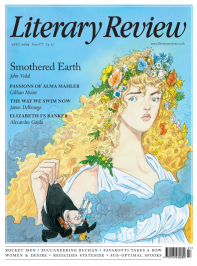David Blackbourn
Propaganda & Purges
Culture in Nazi Germany
By Michael H Kater
Yale University Press 453pp £25
‘When I hear the word culture I reach for the safety-catch of my Browning.’ These words, often attributed to Hermann Göring or Joseph Goebbels, were actually spoken by a character in Schlageter, a drama by Nazi playwright Hanns Johst. First performed in 1933, the year Hitler came to power, the play was dedicated to him. Its most notorious line sums up the brutal violence the Nazis directed against forms of culture they hated. That meant, above all, the different varieties of modernism that emerged in the Weimar Republic, whether in art, drama, music, architecture or design. The Bauhaus was driven out of Germany and atonal music was removed from concert programmes. In large-scale book-burnings, ‘un-German’ literature was consigned to the flames, while abstract works were taken from the walls of public galleries and placed in a travelling exhibition of ‘degenerate art’. Theatre, cabaret and music were ‘Aryanised’, with impoverished Jewish performers banished to a Jewish Culture League designed to serve only Jewish audiences. Jewish musicians were forbidden to play ‘German’ music – Beethoven was banned from their repertoire in 1936, Bach in 1937. The creation of the Jewish Culture League, eventually dissolved in 1941, anticipated in the cultural realm the physical ghettoisation of Jews that preceded the Holocaust.
Michael Kater’s new book is a reliable guide to this grim subject. Culture in the Third Reich was intended to mirror the values of the ‘people’s community’, to entertain and distract, and – especially during the war – to serve as a propaganda vehicle. These objectives were often

Sign Up to our newsletter
Receive free articles, highlights from the archive, news, details of prizes, and much more.@Lit_Review
Follow Literary Review on Twitter
Twitter Feed
The dropping of the atomic bomb on Hiroshima in August 1945 has long been regarded as a historical watershed – but did it mark the start of a new era or the culmination of longer-term trends?
Philip Snow examines the question.
Philip Snow - Death from the Clouds
Philip Snow: Death from the Clouds - Rain of Ruin: Tokyo, Hiroshima, and the Surrender of Japan by Richard Overy
literaryreview.co.uk
Coleridge was fifty-four lines into ‘Kubla Khan’ before a knock on the door disturbed him. He blamed his unfinished poem on ‘a person on business from Porlock’.
Who was this arch-interrupter? Joanna Kavenna goes looking for the person from Porlock.
Joanna Kavenna - Do Not Disturb
Joanna Kavenna: Do Not Disturb
literaryreview.co.uk
Russia’s recent efforts to destabilise the Baltic states have increased enthusiasm for the EU in these places. With Euroscepticism growing in countries like France and Germany, @owenmatth wonders whether Europe’s salvation will come from its periphery.
Owen Matthews - Sea of Troubles
Owen Matthews: Sea of Troubles - Baltic: The Future of Europe by Oliver Moody
literaryreview.co.uk